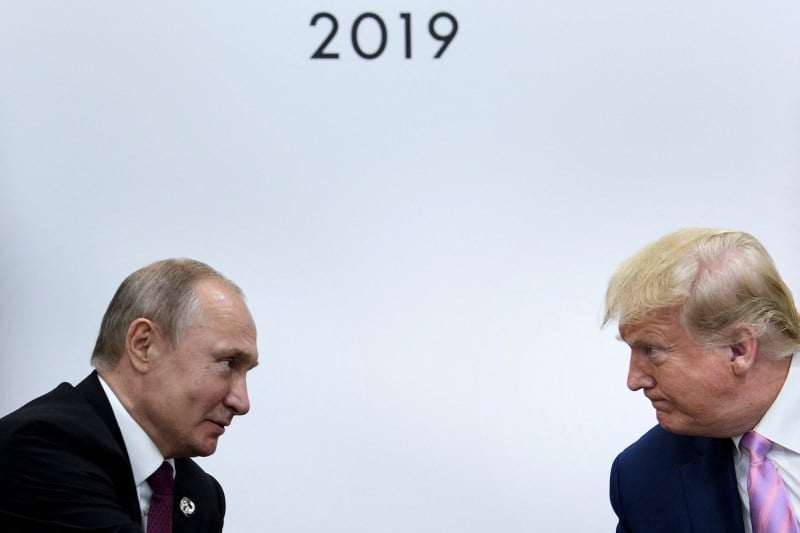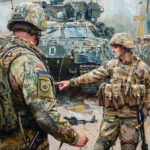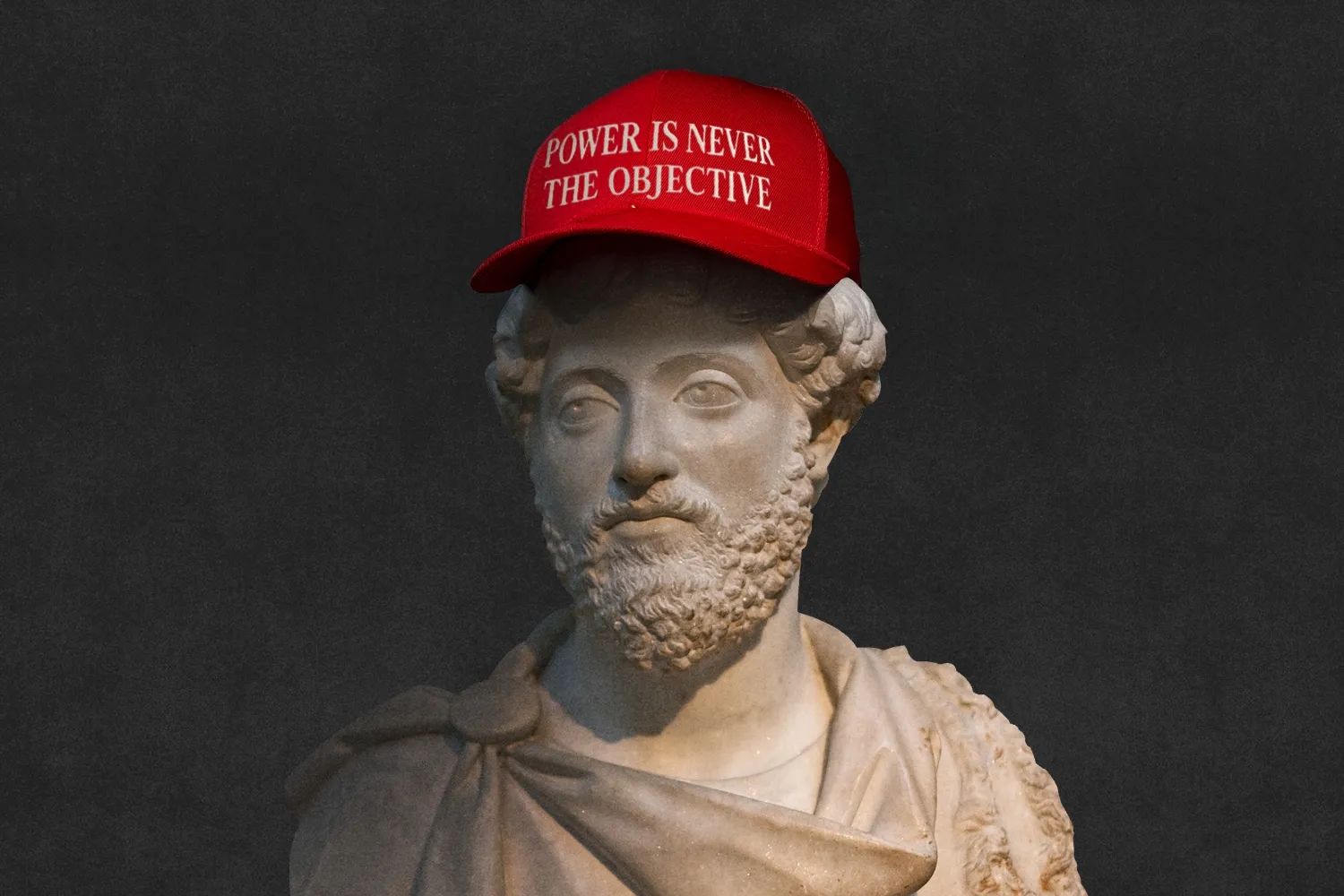Trump’s Proposed Economic Rapprochement With Russia is Wrongheaded

Trump’s Proposed Economic Rapprochement With Russia is Wrongheaded
Sanctions are sticky, the Russian economy is dodgy, and almost all it sells is oil. Where is the upside?
Russian President Vladimir Putin and U.S. President Donald Trump attend a meeting during the G-20 summit in Osaka, Japan, on June 28, 2019. Brendan Smialowski/AFP via Getty Images
The Trump administration’s hopes for a grand economic rapprochement with Russia are either an inducement to Moscow in the ongoing peace talks over its three-year war in Ukraine, or a preemptive surrender by a U.S. president sadly familiar with waving the white flag before America’s adversaries.
Either way, experts say the idea is ill-considered, poorly timed, doomed to fail, and counterproductive.
The Trump administration’s hopes for a grand economic rapprochement with Russia are either an inducement to Moscow in the ongoing peace talks over its three-year war in Ukraine, or a preemptive surrender by a U.S. president sadly familiar with waving the white flag before America’s adversaries.
Either way, experts say the idea is ill-considered, poorly timed, doomed to fail, and counterproductive.
Just four weeks after U.S. President Donald Trump threatened Russian President Vladimir Putin with harsher economic sanctions if a deal to end the war in Ukraine is not reached, Trump and his team are breaking out the carrots.
Trump himself praised his talks with Putin and promised “major economic development transactions” with Moscow. After talks with his Russian counterparts last week in Saudi Arabia, U.S. Secretary of State Marco Rubio, once known as a foreign-policy hawk, said that a Russia-Ukraine peace deal could unlock “incredible opportunities” for the United States to partner with Russia. Steve Witkoff, Trump’s special envoy to the Middle East and now apparently his latest channel to Moscow, said that a peace deal over Ukraine would bring U.S. businesses back to Russia. Mike Waltz, the U.S. national security advisor, told reporters that one week of diplomacy with Moscow could quickly lead to “very productive and stabilizing relationships” with the country that a former Republican presidential candidate once called the United States’ main “geopolitical foe.”
“If this is how Rubio and Waltz are steering the ship, they are heading straight for an iceberg,” said Steven Pifer, a former U.S. ambassador to Ukraine and veteran diplomat.
The problem is not just that economic normalization and sanctions relief are some of the most coveted items on the Kremlin’s wishlist, behind only the annihilation of Ukrainian nationhood. Nor is it that sanctions relief and a return to business as usual would only give Moscow the breathing space to rearm and try for Ukraine again, thus intensifying the security burden on a NATO and a Europe that has, in the space of less than two weeks, had to learn to live without a U.S. security umbrella that had been happily unfurled for 75 years.
One big issue is that a U.S. pledge to restore economic relations means a relief in sanctions, just when the United States and the West had finally managed to get Russia to a place where the curbs on energy exports, tech imports, and other money movements were finally paying dividends. Leverage, as Euclid elucidated centuries ago, means not losing sight of the sharp end of the stick.
That aside, the notion of Russia’s economy as an “investment prospect” is itself dubious. This is a place with 21 percent interest rates, inflation that is higher than what hurt former President Joe Biden, and labor and supply chain problems that would vex nimble economies, let alone sclerotic ones.
Couple that with the absolute lack of rule of law—Russia is a place where investments are placeholders, not assets; those who find themselves in favor with the Kremlin end up in resorts such as Sochi, while those who don’t end up in Siberia—and you can see why U.S. businesses have cold feet. That did not dissuade Rubio or Witkoff from dangling economic concessions, but then, this is a new, and seemingly naive, administration.
“Russia is a great first date. They show up looking like a million bucks, and then, of course, they lure you in, hand you to the tough guys and bureaucrats, and then work you over,” said Craig Kennedy, a former investment banker in Russia who is now at Harvard University’s Davis Center for Russian and Eurasian Studies.
Western companies—from automakers, to IT firms, to fast-food restaurants—have fled Russia for the most part since Moscow’s full-scale invasion of Ukraine, though some, such as Air Serbia, have stayed. The costs for Russia are huge, while the costs for Western firms of either leaving or staying are even higher: Western firms had to either pay extortionate “exit fees” in the form of taxes on their way out or face the threat of reprisals if they come back. This is not the commodity-fueled, early 2000s Russian economy with a laptop and lap dance for everyone.
U.S. economic sanctions are also sticky. Many of the ones on Russia have been there since 2014, when Moscow first invaded Ukraine and annexed Crimea. Some, though not all, are congressionally mandated, which means undoing them would require a functional and compliant U.S. Congress. U.S. companies—especially banks—are deeply allergic to doing business in places that are or just were under sanctions. Ask Iran just how quickly business-as–usual snaps back once the executive order is signed.
Even more bizarre is that Russia’s economy depends on fossil fuel exports, as do Trump’s plans for U.S. energy dominance. To the extent that Trump offers Russia sanctions relief—and there are a few wonky things that could expire in the next day and the next two weeks, energy-sanctions wise—he will be directly working against the thing he told voters he would be making stronger, not weaker. If Russia gets the financial cuffs taken off, the first thing it is going to do is flood Europe with cheap gas, which will thrill the Germans and appall everyone on the U.S. Gulf coast, who were hoping to send fleets of tankers full of U.S. natural gas to Europe.
Trump likes to play at geopolitics, even if diplomats and longtime observers fret, worry, and wonder. His gambits to take over Greenland, Panama, Gaza, and Ukraine are alarming and revealing. Moving pieces on a board is easier than moving pieces and people in real life.
“The risk thing, it was fun when I was 15,” Pifer said. “I am not sure it is a guide to geopolitics today.”
Keith Johnson is a reporter at Foreign Policy covering geoeconomics and energy. X: @KFJ_FP
More from Foreign Policy
-

People stand in front of NATO headquarters in Brussels. It’s Time for Europe to Do the Unthinkable
Brussels has slavishly followed Washington for too long—and forgotten how to advance its own geopolitical interests.
-

Samuel Huntington holds his hand to his chin while sitting in an office. Samuel Huntington Is Getting His Revenge
The idea of a global “clash of civilizations” wasn’t wrong—it was just premature.
-

German Chancellor Olaf Scholz visits weapons maker Rheinmetall in Unterluess, Germany on Feb. 12, 2024. How Europe Can Defend Itself
Here are 10 steps European leaders can take now to bolster the continent’s defenses without U.S. help.
-

J.D. Vance gestures with both hands open as he speaks into a microphone during the Munich Security Conference. Vance wears a black suit with a blue tie. The New Meaning of ‘Munich’
After J.D. Vance’s bizarre speech, a word synonymous with appeasement may now signal the voluntary surrender of global hegemony.











Join the Conversation
Commenting on this and other recent articles is just one benefit of a Foreign Policy subscription.
Already a subscriber?
.
Subscribe
Subscribe
View Comments
Join the Conversation
Join the conversation on this and other recent Foreign Policy articles when you subscribe now.
Subscribe
Subscribe
Not your account?
View Comments
Join the Conversation
Please follow our comment guidelines, stay on topic, and be civil, courteous, and respectful of others’ beliefs.
Change your username |
Log out
Change your username:
CANCEL
Confirm your username to get started.
The default username below has been generated using the first name and last initial on your FP subscriber account. Usernames may be updated at any time and must not contain inappropriate or offensive language.